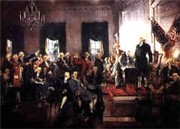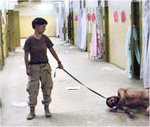One of the unique characteristics of American history is its multi-generation problems. That is, the solution to one problem turns out, generations later, to be the genesis of another, more intractable problem.
The first example of this is in the Constitution itself. Slavery. The Constitution was a festival of compromise, and the compromises made to accommodate slavery, like the "three-fifths" rule, eventually birthed Civil War. Southerners felt that an endorsement of slavery was literally written into the document, never mind that flowery Bill of Rights, and in fact it was. After the war three specific Constitutional Amendments were required to stamp it out.
The Civil War is the last time war has come to the United States, save for specific acts which precipitated war — Pearl Harbor and 9-11. Since 1865 the U.S. military has been a road team. The Spanish-American War gave us a taste for imperialism, especially in Latin America and the Caribbean, which we have yet to lose. World War I was a horror, and in fact we seemed to learn the key lesson there that war is to be avoided, not embraced, especially foreign wars.
World War II, and the events leading up to it, overthrew this assumption utterly, much as the Civil War overthrew the assumption about slavery. Munich (above), and Pearl Harbor, turned around our attitude about foreign war, especially among Republicans, who had until then been such fervent isolationists.
And this era now comes back to haunt us, the way slavery came back to haunt the Civil War generation. Our task is equal and opposite to that generation’s task. While they required a war to eliminate injustice, we now require an end to war for justice to stand a chance.
What brings this home is Ken Burns’ second masterwork, The War, which is a bookend to his previous The Civil War.
One of the great themes of The War, I saw upon watching it, was how an
entire generation compartmentalized the experience. The War was, in
Sherman’s words, "all hell," yet millions of men came out of that hell
and filed it away, forgot it, pushed it aside.
Like millions of you, I’m the son of a WWII veteran. My father never
discussed his service. He possessed no reminders of it. He never went
to a VA hospital, he never joined the VFW, he just pushed it aside and
went on with his life even though, when pressed to discuss it, all he’d
supposedly done was "shoot alligators in Guyana" and "get drunk in
Antigua," which left him with a life of migraines he usually medicated
with whiskey.
My Uncles, Thomas and John, also served. Thomas even became a military
lifer, using his 20 year hitch to get a police job, using that 20 year
hitch to gain a great retirement package, then dieing of cancer before
he could really enjoy it. John outdid them all. Uncle John served in
the infantry from D-Day through VE-Day. On his 80th birthday, which we
celebrated at a family reunion, my aunt Dorothy presented him with a
marvelous, life-sized blow-up of him right after the war, in Germany,
striding confidently in a clean uniform, forever young and strong and
victorious.
Yet Uncle John didn’t talk about his service, either. He set it
aside. He too became a cop, ending his career as spokesman for the
Nassau County cops. He raised two lovely daughters, and still lives in
the same small house his late wife Serena grew up in.
Setting the horror aside, compartmentalizing it, was the price the
Greatest Generation paid to get past the war. They supported the idea
of overseas wars with their votes, as Democrats and later as
Republicans. They understood the necessity, so when any politician
invoked Munich their knees jerked, and they followed, delivering sons
to the meat grinder of Vietnam and grandsons to the meat grinder of
Iraq.
While Munich drew the right lessons for its time, it did not draw
the right lesson for all time. Containment, the Cold War policy which
defined our lives from 1947-1989, was not the same as total war. And
pre-emptive war, which is the policy of the current government, is not
containment, either.
Pre-emptive war is, in fact, an extension of Munich, just as slavery was extended westward to balance North and South during the years
between the Constitution’s ratification and the grim necessity of Civil
War. Pre-emptive war itself, in fact, has a lot in common with the filibusters of the 1850s,
confederates who tried to take over Latin America and the Caribbean in
order to extend slavery. They were the terrorists of their time and
they made America, before the Civil War, a terrorist haven.
What was the Texas War for Independence really about? Really.
Southern slaveowners invaded a part of Mexico, which had outlawed
slavery, and overthrew its government when its laws on freedom defied them with arms. That’s not what Texas schoolchildren are taught, even today, but such was the reality.
And such is the extent to which people will lie in order to hide evil
reality from young people whom they wish to raise as patriots.
And so we have lied about Munich. So we have extended the lessons of
Munich, as our forefathers extended the compromise of slavery, until it
bears no relation to normal reality, until it makes us the enemy we
once most feared.
The perversion of Munich, made possible by the compartmentalization
of the Greatest Generation, their desire to hide the true horror of war
from their children and grandchildren, is just as great a challenge to
our time as slavery was to Lincoln’s time.
The great irony is that our challenge requires the opposite
response. The only way for slavery to end was for Americans to kill it,
through force of arms. The only way for the Munich perversion to end in
our time is for Americans to embrace peace, and peace-making, and make
war against oil rather than for it.
In writing this, I do not condemn my father for doing what he had to
do, or those of his time, any more than the writers of the Constitution
could rightly have been blamed for the Civil War, and the whole
document scuttled once the war was won. But it is not my dad’s time any
more. My dad died in 1999. This is my time, your time, and the time of
our children. My dad’s life is not on the line here. My son’s is.
We have much to learn over the next several years, and the learning
of it will be much harder than we expect it to be, even now. Ending the
psychology of the Road Team may, in the end, prove as hard as ending
slavery was, only this is a struggle for hearts and minds.
















I’m glad you mentioned the Texas War for Independence. I think that war and the way it is lionized rather than reviled, thanks to revisionist history and just plain bullshit artistry, has a lot to do with why we are in Iraq. When Bush and his apologists talk about history vindicating him, they are likely “remembering the Alamo.” They feel that if we can do enough that Iraq is still in our sphere of influence in 60 or so years that by then all the loss of life will have been transmuted into heroic sacrifice and the motives will be remembered as whatever makes people feel good about the whole thing. It’s pretty much proven by now that two generations is all it takes for the general population to forget what really happened in any given situation. By 2070, even the average Iraqi may believe them same bullshit about this war as our grandchildren.
I’m glad you mentioned the Texas War for Independence. I think that war and the way it is lionized rather than reviled, thanks to revisionist history and just plain bullshit artistry, has a lot to do with why we are in Iraq. When Bush and his apologists talk about history vindicating him, they are likely “remembering the Alamo.” They feel that if we can do enough that Iraq is still in our sphere of influence in 60 or so years that by then all the loss of life will have been transmuted into heroic sacrifice and the motives will be remembered as whatever makes people feel good about the whole thing. It’s pretty much proven by now that two generations is all it takes for the general population to forget what really happened in any given situation. By 2070, even the average Iraqi may believe them same bullshit about this war as our grandchildren.